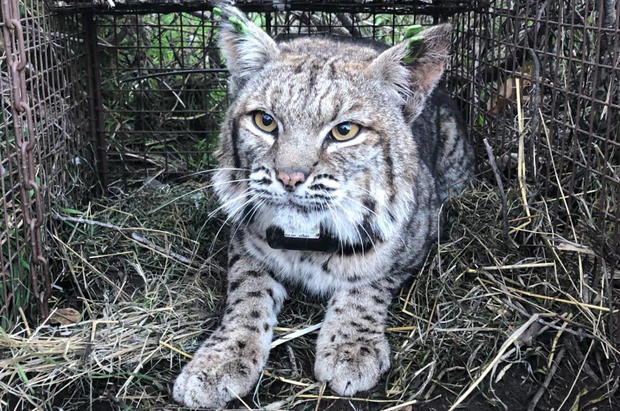Bobcat, Mountain Lion Found Dead In Santa Monica Mountains Tested Positive For Several Types Of Rat Poison
THOUSAND OAKS (CBSLA) — A bobcat and a mountain lion have been found dead from rat poison in the Santa Monica Mountains, the National Park Service said Thursday.
The adult female bobcat, known as B-372, is the first in 23 years to have died from the effects of anticoagulant rat poisons. She was last examined in January, when researchers determined she was in good health and had given birth in the past.
"We basically never see this in bobcats, so this is an important finding," biologist Joanne Moriarty said in a statement.
B-372's liver tested positive for three types of rat poison after her body was found on June 20 under an oak tree in Agoura Hills. She was found to be extremely emaciated, and a bone marrow test showed signs of chronic anemia, the National Park Service said.
Researchers say B-372 spent much of her time in residential areas, which is atypical for adult female, possibly due to her natural habitat being devastated by the 2018 Woolsey Fire. Spending more time in residential neighborhoods may have increased her exposure to the poisons often used by homeowners and businesses to control rodents, the National Park Service said.
Researchers said that even though more than 90% of bobcats within the Santa Monica Mountains test positive for exposure to one or more rat poisons after death, internal bleeding is not usually seen in the animals.
P-76, the male mountain lion who was found last November in a Northridge neighborhood, was determined to have died from internal bleeding due to ingesting five types of rat poison. His collar went into "mortality mode" on Jan. 29, and his carcass was recovered the following morning north of Highway 118. He is the sixth collared mountain lion to die of uncontrolled internal bleeding, and the third in the past two years.
Coyotes, foxes, and mountain lions have been known to die of uncontrolled bleeding, but typically not bobcats, National Park Service officials said. Such bleeding has also been linked to fatal mange disease.




